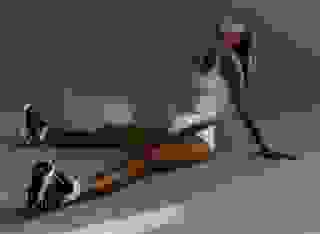All Comments on 'Royal Sentence Ch. 04-05'
by MProst
- 20 Comments
Very good writing but little slow in story development.I would love to see MORE and LONGER chapters in the next installment.
I am waiting with bated breath for next chapter. Roland's torturous methods leave me wanting Sabine to give in for her sake. I am loving this story. Thank you.
feel as we do for pretty,young and sexy captive rebel girl Sabine's erotic torture and bondage under interrogator Roland....interrogator to interrogated equations are just this rough and treacherous..arent they?!;))Still makes us feel bad as Sabine has been through so many tragedies..back to back!!
....But also...the rebel sentiment and passion which makes them endure so much torment at the hands of interrogators if they are captured....and through all the torture they try to shield their accomplices....all that loyalty beautifully captured in Sabine's emotions....creating non con magic between her and Roland...!!;))
Super well written story,writer!!:))...we find each chapter so short...that we wish that these went on and on for our reading...and never stopped!! :))
..... we are not bored. Many intriguing pieces added to this absorbing tale. Awaiting more.
I have always been partial to a bit of historical element in the stories on this site and this is one of the best I have read! Looking forward to the next chapter and will be coming back for sure! If I could add one request, it would be to make chapters longer...but since you are posting them quite frequently, shorter ones are also much appriciated! :)
Hey you, yeah you the one who is writing this amazing story! Can you please continue to chapter 6 and 7 I am waiiiittting lol
Amazing little story! We are all eagerly awaiting the next segment.
I am slayed - SLAYED - by the genteel, orgasm-denying courtier.
Pleeeeaaaase with 🐶 puppy eyes on my knees I'm begging you!
I do hope you haven't abandoned this story as it's quite good, and definitely in the time period I most enjoy. I am sure all the readers who favored Royal Sentence would join me in encouraging you to continue in the very near future.
This is a very great story, and so well written. But it has been over five months since the last chapter and that is just too much to maintain an interest. Such a shame. If you have abandoned the story, or have died, please let us know. ☹️
I really enjoy this story but I'm frustated by the lack of an update.Pretty please write more chapters.
I'm sorry, but I think that two years to master sword-fighting, knife throwing, arbalest, bow and pistol shooting is not very believable.
The arbalest and the pistol would be much quicker to attain proficiency at, but mastering swordfighting and the bow takes much more than just two years.
Someone with two years of experience with sword fighting might be able to overpower the normal footpad, but it will not do you much good against properly trained troops, and being that the 16th and 17th century were defined by Early professional soldiery, there are plenty of these. Mastery of swordsmanship requires a life-long dedication in their art to truly be functional at such a high level as to be called 'masters'.
Additionally, hand-to-hand combat was virtually universally taught alongside sword training just because of how central it is in the art of combat, that I am sure a master would refuse to train someone if they wouldn't first learn about wrestling and grappling because no 'Master' or trainer wants to be known as the guy who got a student killed because they didn't know how to fight in a brawl. Even in the age of the rapier, grappling was still an important skill to know. The sword is an extension of the hand and so knowledge about how to fight in hand to hand is very important, because swordfights can just as quickly turn into a brawl whenever a sword gets put into a bind or whenever someone grips onto a sword. Medieval and Early-modern master swordsmen were every-bit as brilliant fencers as they were martial-artists. With an emphasis on arm and finger breaks, eye-gouging, leg-locks and grappling they can kill with their hands as well as with their swords or polearms. This is just as true with the Samurai as it is with an Ancient Egyptian warrior from 1000 B.C.E.
Archery is also a craft that takes many, many years in order to reach a level
approaching anywhere near 'master' level. The bow was also considered a fringe weapon by the 17th century in Europe and was barely used in any context, excepting the English who brought Longbows with them to the Colonies in America. The very fact that armour forms such as the jack-of-plates was common on battlefields in the 17th century by even poorer troops renders weapons such as bows ineffective and near-useless. They were practically useless even in the 16th century. Even the arquebus has difficulty against munitions-level armour of the 16th and 17th century, with estimates of 200-500 joules being attributed to them. The Spanish musket was the first hand-held weapon that could reliably pierce even the best armour of the period, with estimates of around 2000+ joules of energy being attributed to such firearms based on the weight of shot and the muzzle velocity. What in the hell is a bow going to do when the heavier warbows can only deliver around ~150-180 joules with a heavy arrow?
Bows were thus phased out except in England within the Early-modern period. Even in the High and Late medieval periods bows were uncommon in all of Europe except within Andalusian Spain and England, as the crossbow had supplanted the bow both as a war weapon and a hunting weapon.
Knife throwing wasn't a thing in the 17th century except among Native American Indians. If you also want to consider the Bo-shuriken and Shurikenjutsu as knife throwing you can also list that down.
Mastering all of these things together in just two years? That's preposterous.
I think that a re-phrasal would ensure that the story sounds much more believable. She had trained in such and such skill or became proficient in such and such skill et cetera sounds much more plausible than 'mastering'.
This might seem like I am going off on a tangent, but I am giving you my thought on how it sounds as it is and I think it sounds ridiculous at the moment. As it seems to me, Sabine isn't Mark Stretton, nor is she George Silver.
Would it help if I replaced 'mastered' by became proficient at'? Because really, that's what was meant here -and incidentally, what the verb actually means-.
Of course she wouldn't become a sword master in two years, but she would still hold her own against most foot soldiers and militia, peasants lured into enrolling (many recruiters would get them drunk or trick them into signing), who then got a crash course training.
Sabine isn't trained by a master but by a noble friend who was likely taught by a good fighter (true sword maestros did cost a fortune), and fencing didn't include hand to hand combat, something most masters of the time would have regarded as demeaning. When given, the latter would have been limited to basic boxing/wrestling -they weren't ninjas-, offering her a small chance against a much stronger opponent.
She must not have been an absolute beginner with the crossbow or pistol, as noblewomen did take part in hunting, and a lot of them were very good shots, but she wouldn't have practiced while in the nunnery. Same goes for fencing, to which she might have been initiated. A few ladies of her time were highly skilled with the sword.
Archers were still part of the French army, the Archer's Company was only dissolved in 1789, but the bow wasn't very used on the battlefield, despite most foot soldiers only wearing thick leather vests. Chest plates were too expensive for canon fodder, only foreign mercenaries wore them.
Archery games were popular in France up to the end of the previous century, and with the story set in 1619, it's likely that many in the countryside still kept bows, especially for poaching. Crossbows were expensive and couldn't be home made or repaired. Firearms cost a fortune and easily misfired or exploded. Bows cost nothing to make and maintain.
I'm personally terrible with a bow but I know a good few people who managed to hit the bullseye in no time. Sabine would have used it for hunting game in the forest -not a longbow but a smaller French or Burgundy bow- , and for back-up. Crossbows and firearms took time to recharge, when a bow doesn't. She wouldn't need to be a competition archer for that, just an average one. Does it make sense?
I never intended to paint her as a historical Wonder Woman, but I do maintain that two years of daily training with a strong motivation can achieve a lot in terms of fighting skills.
-foot soldiers and militia, peasants lured into enrolling (many recruiters would get them drunk or trick them into signing), who then got a crash course training.-
With two years of experience she could definitely fight against such foes, at least on a one-to-one basis, though she should be careful in doing so, since you have said that she lacks experience with hand-to-hand, which without training she would be at a disadvantage even against untrained males.
Interestingly enough, In the High and Late medieval period, Militia were sometimes just as well outfitted as soldiers. At Wisby, The Gotland militia were armed with coats of plates, mail hauberks and gambesons in quite staggering numbers.
- and fencing didn't include hand to hand combat, something most masters of the time would have regarded as demeaning. When given, the latter would have been limited to basic boxing/wrestling-
This is interesting in that it seems that, based on fighting manuals (Which I've looked through on Wiktenaur.com) that there are treatises which show only rapier fencing without any action involving the hands, but others such as Cappo ferro's treatise which show images where the main combatant is gripping onto the opponents arm or hand of the opponent's sword arm.
It seems that during the 16th and 17th century there was a lot of disputes over how one should fight with a weapon.
The German masters seemingly stuck to their traditional style of Longsword, messer and polearm and borrowed some other weapons including the Rapier. Seemingly they were very much a 'Kill by any means' type of people. It seems that the German fighting mentality at this period is very similar to the first German master Johannes Liechtenaur. These would be the people in an uproar about Sabine not being taught grappling and wrestling. It seems that there wasn't a lot of scorn by other masters about the German styles, and how could they... I for one would not want to shit-talk the German masters because they would literally laugh before hacking me to pieces.
The Spanish had their own styles of rapier fencing, whilst also retaining some traditional fighting styles, such as Figuerdo's montante (Greatsword) treatise, which was seemingly reviled in the mid 17th century. I'd say they reviled it because everyone else likely kept getting their asses whooped by a guy with a huge sword, but who can say! ;P
The Italians also had their own rapier techniques and it seems that Italian rapier schools had successfully dismantled most native Italian longsword and polearm techniques into obscurity, whilst retaining the Rotella shield for figthing along with the rapier.
There are also people like George Silver who disliked the Italian rapier style and chastises the Italian master Vincentio Saviolo who lead a school in London. It is said that George Silver also had a duel with the Italian master, though It doesn't say who won.
So it is possible that Sabile couldn't have learnt any form of hand-to-hand... but at the same time there were other masters who would literally be howling about how idiotic that is. It largely depends on who is teaching you.
It's pretty funny how even today there are big disputes over how martial arts should be taught, though Ironically this is largely from within Japan. It seems that there is a movement who wants to know the traditional art that is most likely to have been used by the Samurai which has been lost in Kendo. There are also rivalries between Dojo masters.
In Europe and America, there has been a large push since the late 90's to rediscover the martial arts of the Late-medieval and Renaissance periods. The group known as HEMA (Historical European Martial Arts) has classes that range from Roman-period gladiatorial combat up to Victorian backsword.
Personally, I've overcome a stupendous amount of misconceptions by watching Hema practitioners showcase their fighting styles. When Victorian fencers said that medieval combat was likely just thrashing and bashing each other or that medieval swords were clumsy and stupidly overweight, they were largely speaking out of their asses. Roland Warzecha, Arne Koets, Matt Easton, Michael Chidester and many others are literally bringing back lost arts from the precipice, either because they are distributing books or translating four hundred year old or older manuscripts into multiple languages or because they are constantly training and sparing out a system that is most likely to be 'Medieval' fighting that the old masters wrote about, and I think that this is a very good thing.
-Archers were still part of the French army, the Archer's Company was only dissolved in 1789, but the bow wasn't very used on the battlefield, despite most foot soldiers only wearing thick leather vests.-
Well that is very interesting. As far as I know the English quickly abandoned Warbow archery in the mid-17th century during the Civil war because their effectiveness was brought into question by varying commanders, who noticed that over a period of a military campaign they could no longer draw their bows to full draw due to fatigue, likely aided by long marches and lack of sufficient food, whilst men equipped with muskets or calivers were fully capable of using their weapons with the same level of fatigue.
It is quite funny given that the English have a big cultural emphasis on Archery and yet they withdrew them from service a hundred or more years before the French.
****End Note****
Well this went on for a lot longer than I intended. I have no idea how I can manage to recall all these things from memory.
Truly exceptional! Love the historical details it brings the whole thing to life. Honestly I’ve never been happier that I was born in the 20th century. Life still isn’t a picnic for women even though most don’t see the prejudice in western countries, as for the rest of the world well no change there.
Tess (uk)














